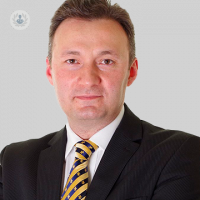Male breast cancer: what are the symptoms?
Written by:Breast cancer can affect men as well as women. It is estimated that less than 1% of all breast cancers occur in men and around 370 men are diagnosed each year in the UK. Male breast cancer is most common in older men, but it can occur at any age.
Would you be able to recognise the symptoms of male breast cancer? One of our leading oncoplastic surgeons Mr Hazem Khout explains everything that you need to know about the disease.

Can men develop breast cancer?
Men have breast tissue as well as women. However, men’s bodies normally produce less breast stimulating hormones. The lifetime risk of getting breast cancer is 1 in 833 for men compared to 1 in 8 for women. Male breast cancer is a very rare disease. Most affected men are over 60, although it may affect younger men as well.
What are the symptoms of male breast cancer?
Male breast cancer can present with one or more of the following symptoms:
- Painless lump or hardening in the breast tissue
- Change to the nipple including redness, scaling, inversion or discharge
- Changes to the skin over the breast tissue such as indentation and puckering
- Lumps under the armpit.
What to expect in the breast clinic?
The one-stop breast clinic will involve seeing your surgeon who will take a full history including family history, a clinical examination, which will be followed by doing scans (mammogram and ultrasound scan). If an abnormality is identified, a tissue sample will be taken under local anaesthetic.
The results of scans will be explained during the same visit. If a biopsy is taken during the visit it will take a few days to get the results back. All the results are discussed in a fully staffed multidisciplinary meeting.
What causes breast cancer in men?
Breast cancer happens when breast cells grow more rapidly than healthy cells. The causes of male breast cancer are not fully understood. There are risk factors for male breast cancer, which are very important to understand especially that men do not get routine screening and do not expect the possibility of getting breast cancer. Therefore, most men present at an advanced stage.
What are the risk factors for male breast cancer?
There are risk factors that increase the risk of male breast cancer such as:
- Older age (over 60) with the average age of men diagnosed with breast cancer being about 68.
- Exposure to a high level of oestrogen - this happens as a result of hormonal therapy for prostate cancer, liver diseases that reduce male hormones and an increase in female hormones, such as cirrhosis, Increased body weight and testicular diseases.
- Radiation exposure.
- Klinefelter’s syndrome - in this genetic syndrome boys are born with one copy of X chromosome. Klinefelter syndrome is a condition present at birth that affects about 1 in 1,000 men.
- Family history of breast cancer and Inherited genetic mutations - a strong family history of breast cancer increases the risk especially if other men in the family have had breast cancer.
Men can also inherit genetic mutations that can cause breast cancer such as BRCA1 and BRCA2. The lifetime risk of developing breast cancer is approximately 1% with the BRCA1 gene mutation and 6% with the BRCA2 gene mutation. It must be said that most of the male breast cancer happen in men with no family history and no inherited genetic mutations.
At what age might male breast cancer typically occur?
The average age of men diagnosed with breast cancer is about 68. However, it can affect men of any age. There has been a slight increase in the incidence of male breast cancer over the last few decades. This might be a true increase in incidence or a result of increased awareness of male breast cancer.
How is male breast cancer treated?
It's important to emphasise that men diagnosed with breast cancer at an early stage have a very good chance for cure. The earlier stage breast cancer is diagnosed the better prognosis it has. Treatment of male breast cancer includes surgery to remove the breast tissue (mastectomy) and some, or all, of the lymph glands under the armpit. Most patient will require further treatments such as chemotherapy, radiotherapy and hormone therapy (Tamoxifen).
The treatment plan for each patient is discussed and decided in a multidisciplinary meeting to personalise the treatment according to the patient’s specific factors.
If you would like to discuss any unusual symptoms that you have noticed in your breast, you can make an appointment with Mr Khout via his Top Doctor’s profile here. Can’t make the appointment in person? He is also available for a video call using our e-Consultation tool, which can also be found on his profile.


